Notably, the BBC News website did not publish any coverage whatsoever of Israel’s Memorial Day (April 24th – 25th) or 75th Independence Day (April 25th – 26th).
However April 26th did see the appearance of a report by Rhodri Davies on the website’s ‘Middle East’ page under the headline “Israeli Arabs torn over judicial reforms protest movement”.
Rhodri Davies is a BBC World Service journalist rather than a Middle East or Israel correspondent. Over a week earlier BBC World Service radio had aired an item by Davies on the April 18th edition of ‘The Newsroom’ (from 16:49 here) which includes some of the interviewees and talking points also showcased in his written report.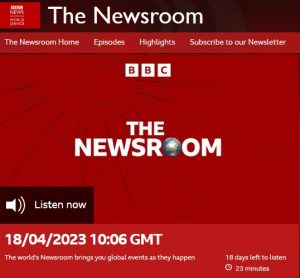
The narrative promoted in both items is expressed as follows in the introduction to the audio version: [emphasis in italics in the original, emphasis in bold added]
“Tens of thousands of people have taken to the streets but Palestinian citizens of Israel have been relatively absent from the marches, despite some arguing that they’ll suffer most from the planned changes. Now there are claims that protests against the Israeli occupation of the Palestinian territories are becoming a larger part of the demos.”
In the item itself Davies mentions the Israeli flags and the singing of the national anthem at the protests, going on to tell listeners that:
Davies: “…but increasingly a so-called anti-occupation bloc is visible, openly waving Palestinian flags, although they are tiny in number.”
The same talking points, along with the three same interviewees, are promoted in Davies’ written report which – like the audio version – begins at the March 30th Land Day protest in Sakhnin but does not inform BBC audiences how Davies came to be at that event or who coordinated his interview with a specific participant.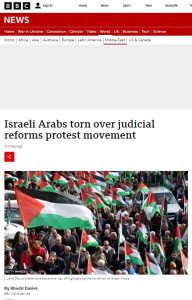
In both versions of the report, that interviewee’s promotion of the ‘apartheid’ smear goes unchallenged by Davies:
“At a recent march for Land Day, Jameel Saed denounced the nationwide protests against controversial judicial reform plans that have convulsed Israel since the start of the year.
“I didn’t participate in any and I’m not going to. I don’t think that many Palestinians did,” said the student from the Arab city of Nazareth, in northern Israel.
“The Israeli protests are calling to get the status quo back – to ‘claim back democracy’. But we don’t think that it was anything but tyranny and apartheid.”
Davies tells readers of the written version that:
“Jameel is one of Israel’s approximately two million Israeli Arabs. Israeli Arabs are Palestinians and their descendants who remained in the land which became Israel in 1948. They comprise about 20% of Israel’s population. While they are officially citizens of Israel, many – estimates and polls vary – self-identify as Palestinians.”
In fact, only a minority of Arab Israelis self-identify as Palestinian.
Davies goes on to present a distorted view of the case of Masafer Yatta where people who were unable to prove any rights to the land in question in court illegally settled in a firing zone declared in 1980:
“Many argue that past Supreme Court decisions which have discriminated against Palestinians, both in Israel and in the Occupied Territories, provide no impetus to defend it. For instance, upholding the 2018 nation state law that stated that in Israel the right to self-determination is unique to Jewish people.
More recently, the court approved the eviction of 1,000 Palestinians from an area in the occupied West Bank so that Israel’s army can use it as a training zone. UN human rights experts warned that the move – without military necessity in an occupied territory – could constitute a war crime.”
Davies tells readers that:
“Calls from Jewish Israelis for Palestinian rights, the occupation and peace to be part of the protest dialogue have been met by the demonstrations’ mainstream with indifference or the argument that they need to remain focused on their own issues to achieve success.
But, despite the current context, some Israeli Arabs are pushing for greater engagement in the Israeli protests.”
He goes on to promote quotes from Aida Touma-Suleiman – a current MK from the Hadash party – and Yousef Jabareen – a former MK from the Hadash party – without any clarification of their connections to that party and without any explanation of its political leanings and agenda.
Another member of Hadash – Alon Lee Green – is extensively quoted by Davies and presented as “national co-director of Standing Together, a grassroots movement that aims to bring Jews and Palestinians in Israel together to achieve peace and equality”. Despite the BBC editorial guidelines concerning “contributors’ affiliations”, readers and listeners to both Davies’ reports were told nothing about that NGO’s funding and political affiliations.
In line with the introduction of the audio report, readers of the written article are told that:
“He [Green] said that carving out space for their voice has been difficult, but is increasingly possible.
“There is a big argument within the protest [over including calls for Palestinian rights],” he said.
He said a large part of the public did not want to bring in the topics of occupation or social justice at the protests. But while the Israeli flag was seen everywhere, people were now able to wave Palestinian flags freely, Mr Green added.” [emphasis added]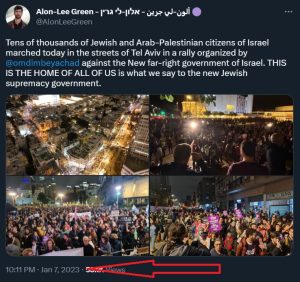
While political NGOs including the one headed by Green have participated in the protests since their outset, their narrow agenda is not the reason why the majority of the hundreds of thousands of protesters have been participating in demonstrations for four months.
Davies refrains from informing readers that while some Arab leaders have encouraged Arab Israelis to take part in the protests since early on, the co-opting of the demonstrations for the advancement of the political agenda of NGOs such as ‘Standing Together’ is seen by some of those Arab leaders as counter-productive. He also fails to clarify that Arab Israeli participation in the cost of living protests over a decade ago was similarly low.
Davies closes his article with promotion of another representative of an inadequately presented NGO:
“Ibrahim Abu Ahmad, who works for a non-governmental organisation, is one of the handful of Israeli Arabs who has spoken at the Israeli rallies.”
That unnamed NGO is called ROPES and it is part of the ‘Alliance for Middle East Peace’ but once again “appropriate information about their affiliations, funding and particular viewpoints” was not provided to BBC audiences.
In both these items Davies promotes representatives of political NGOs without conforming to BBC editorial guidelines concerning contributors’ affiliations. In both items he promotes campaigning narratives already seen in previous BBC reporting on the topic of the protests while providing very little information about the factors that have actually prompted so many Israelis from all sectors of society to participate in demonstrations for seventeen weeks.
Davies’ amplification of the unevidenced claim from a political NGO that “protests against the Israeli occupation of the Palestinian territories are becoming a larger part of the demos” does not stand up to scrutiny but remarkably, that was the messaging the BBC News website chose to promote on Israel’s Independence Day.
Related Articles:
BBC’S FRANKS IGNORES ‘CONTRIBUTORS’ AFFILIATIONS’ GUIDELINES
BBC WS AGAIN PROMOTES A PARTISAN NGO’S TALKING POINTS IN PROTESTS COVERAGE
BBC’S YOLANDE KNELL REPORTS ONE PRIDE MARCH PROTEST, ERASES ANOTHER

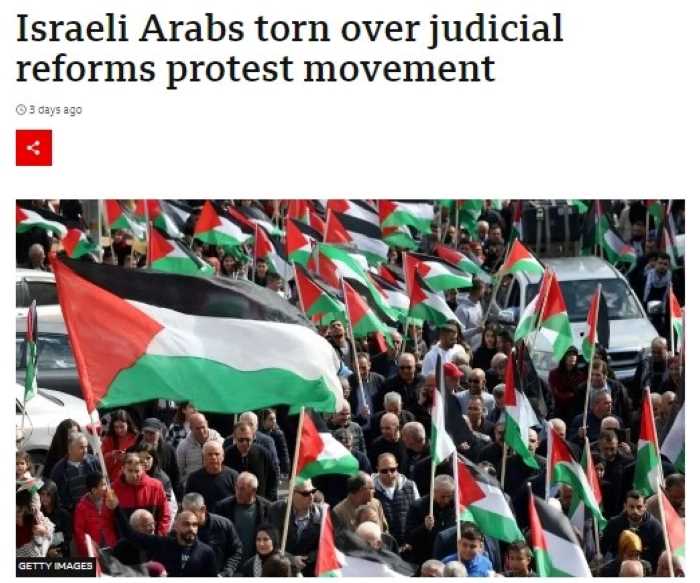

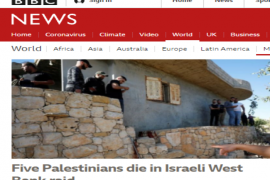
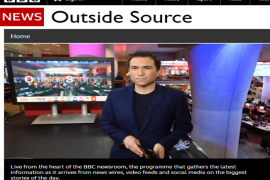
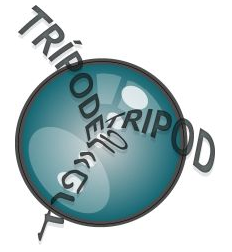
I’m surprised you say nothing specifically of “Israeli Arabs are Palestinians and their descendants who remained in the land which became Israel in 1948.” Which in effect is to claim that the only Palestinians prior to 1948 were Arab.